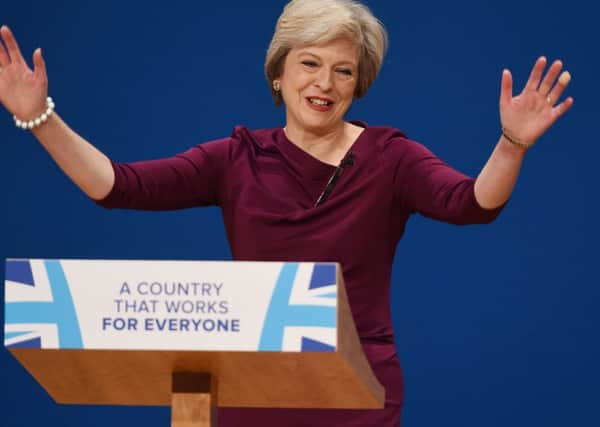Bill Carmichael: May bets on a loss of faith in capitalism


Whenever I am trying to gauge the mood of the country – a notoriously difficult task that I often get badly wrong – my weather vane will usually tell me exactly the way the wind is blowing.
She – let’s call her Louise – isn’t a member of any party, nor even interested in politics in the way I am, but she is shrewd and well informed, reading The Yorkshire Post and the Guardian and listening to the BBC news every day. I would describe her as socially liberal but with a traditional streak.
Advertisement
Hide AdAdvertisement
Hide AdI trust her judgment because so often in the past – most recently on the 2015 general election and this year’s EU referendum – she has been bang on the money while the pundits and pollsters have missed the target by a country mile.
So what did she think of Mrs May’s efforts on Wednesday? In a word, impressed – “she clearly had a well-thought out message and wanted a clean break from the past. She kept going on about a ‘quiet revolution’ and ‘change’ must be her favourite word,” she told me.
“I liked the fact that she wants to represent the whole nation, not just the privileged few.”
OK tone is important, but don’t all politicians promise change and to help the underprivileged? What about the substance – was there any?
Advertisement
Hide AdAdvertisement
Hide AdLouise appreciated the switch of emphasis away from the posh boys of the Cameron and Osborne era (remember them?) and she enjoyed May’s attacks on members of the metropolitan elite and their open contempt for the concerns of ordinary people on such things as Europe, employment, patriotism and immigration (are you listening Project Fear?).
And she was amused by May’s audacious grab for the votes of traditional Labour supporters: “When she was talking about closing tax loopholes and holding big business to account for the way their staff are treated, you could have been listening to a speech from the TUC!
“The Tories as the workers’ party – who would have thought it?”
“Seriously though,” she added, “Labour should be worried.”
There is not much in Louise’s analysis that I would disagree with so far, although I am too much of a natural sceptic not to add, let’s see if what she actually does matches what she has said.
Advertisement
Hide AdAdvertisement
Hide AdBut from there we began to differ. Louise liked May’s views on the role of the state – that there are limits to the free market and when it fails the government should act to help people. Above all that the state can be a force for good.
Certainly this is something of a radical departure from what we have seen before, from both Conservatives and to a lesser extent from the Blair and Brown administrations.
Since the days of Margaret Thatcher free market ideas have been in the ascendancy – the idea that government intervention is more likely to do harm than good, and that society works best when individuals are free to pursue their mutual best interests.
As Thatcher’s close friend and political soul mate, former US President Ronald Reagan, once said: “The nine most terrifying words in the English language are ‘I’m from the government, and I’m here to help’.”
Advertisement
Hide AdAdvertisement
Hide AdFree markets have indeed proved a terrific boon, particularly for the poorest people in the developing world, lifting nearly a billion out of extreme poverty in just 20 years.
But our faith in capitalism in the West was badly shaken by the crash of eight years ago and the stagnation in average incomes ever since.
Just how deep this crisis of confidence goes is demonstrated by the fact we now have a Conservative prime minister promising to use the powers of big government to curb the excesses of free-market capitalism.
I think that is a rash move that threatens the businesses and entrepreneurship on which we all depend for our jobs and for the tax revenues that ultimately pay for the schools and hospitals we value.
Advertisement
Hide AdAdvertisement
Hide AdLouise thinks it is a shrewd tactic that will combat inequality and which is in keeping with the mood of the nation.
I don’t know who is right but if you are in the mood for a bet, Louise has far the better form.